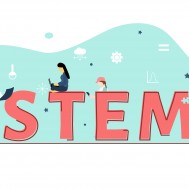There are so many great educational websites for kids and teens just waiting to be explored — where to start?
While they’re searching for answers to the big questions (Why is the sky blue? Why are sharks attacking the internet?) they can stumble upon something that inspires them to learn even more. Maybe something that leads to a career they’d never considered! Maybe just to explore a topic they’d never found interesting before.
We’ve put together a list of our favorite online resources to act as a jumping off point. Read on for fun, free STEM websites that are designed to get kids and teens excited about the world around them.
Elementary

Science
Science Kids provides educational resources, interactive games, and activities for students interested in all kinds of science. Users enjoy experiments, games, facts, quizzes, projects, lessons, images and much more to inspire a love of science that lasts a lifetime.
Tech
Want to build a rocket? Have at it! NASA Kids’ Club is loaded with that and plenty of other space-related projects and activities — perfect for getting the littlest astronauts interested in new technology.
Engineering
For older elementary students interested in engineering, this is the right place. Here, students will find blogs, free newsletters, and simplified research articles about engineering written for and by engineering students!
Math
FunBrain is a math site packed with fun games that reinforce key mathematical concepts and engage young learners. Many focus on a theme like sports, animals, or cool landscapes. Educational videos are also included, and there’s even a special “Playground” section with games perfect for pre-K and kindergarten students.
Middle Grades

Science
See what hundreds of thousands of subscribers and viewers have been raving about for years! SciShow is one of the most popular educational YouTube channels, tackling relevant, real-world science as well as topics covered by standard school curriculums. It’s a great introduction or study guide for middle and highschool science topics.
Tech
As you might imagine, this How Stuff Works is the place to go to find out how stuff works. These videos hold the answers to “when will I ever need to use this in real life?”
Engineering
Engineer Girl encourages middle schoolers, particularly girls, to pursue STEM careers. Users can “try on a career,” speak to actual professional engineers, play games, participate in polls, apply for scholarships, and more.
Math
Prodigy’s approach to fun, digital game-based learning means kids no don’t have to choose between homework and playtime. With fun animations and in-game collectibles, this site has everything you need to keep math learners engaged.
High School

Science
For the young science enthusiast, NOAA is an excellent resource for designing their own experiments and investigations. NOAA helps students explore coral reefs, satellites, and other fascinating places on our planet and beyond. Plus, science enthusiasts might enjoy the STEM competitions offered as a way to connect with like minded folk.
Tech
NASA has additional resources specifically designed for high school students. From writing and STEM contests to up-to-date developments about the latest space missions, there are so many enriching ways to engage with tech through NASA.
Engineering
The website TryEngineering informs students, teachers, school counselors and parents about what engineering is and what engineers do. The site contains information and games about the field, provides lists of student programs and opportunities, and even has a university finder.
Math
For visual learners especially, sometimes challenging concepts require a visual aid. The simulations created by PhET at the University of Colorado, Boulder are enormously helpful in making math fun and bringing science to life for visual learners.
Want to talk STEM?
Tweet us @applerubber on Twitter!
